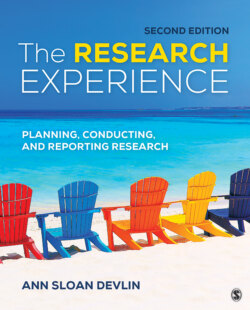Читать книгу The Research Experience - Ann Sloan Devlin - Страница 28
На сайте Литреса книга снята с продажи.
Research and the Value of Common Sense
ОглавлениеYou might be a bit discouraged about how limitations in thinking affect the research process. There is reason for concern; on the other hand, humans have some remarkable cognitive assets.
In 1995, Marvin Minsky gave an address at Connecticut College at the dedication of its new interdisciplinary science center, funded by the Olin Foundation. His address was as wide ranging and stimulating as his research. Minsky is considered a founder of artificial intelligence, and one of his corporate affiliations was as a fellow of Walt Disney Imagineering (http://web.media.mit.edu/~minsky/minskybiog.html). Minsky died in 2016. Imagineers, as the name suggests, were part of a research and development think tank and worked on imagining ideas that might result in possibilities for entertainment (Remnick, 1997). In David Remnick’s article describing the Disney Corporation’s view of amusement in the future, Minsky was reported to have accepted the offer to be an Imagineer because it “reminded him of the early days at the Artificial Intelligence Lab” (Remnick, 1997, p. 222). In describing his view of the future, Minsky said: “I’m telling you: all the money and the energy in this country will eventually be devoted to doing things with your mind and your time” (p. 222). Speaking about what he thought future amusements might have in store, he said, “you’ll put on a suit and a special pair of glasses, and you’ll become involved in an experiential form of entertainment” (p. 222). Virtual reality and Google Glass? This article was published over 20 years ago.
Minsky was obsessed (not too strong of a word) with the workings of the mind. Among Minsky’s many contributions, his book The Society of Mind (1985), written for a general audience, stands out because it provides a perspective on what makes the human mind amazing and distinctive. The book is presented as a series of short topics and reflects Minsky’s wide-ranging approach to discourse. Researchers often focus exclusively on the errors we make (Kahneman, 1991); in this book, Minsky also points out some of the cognitive assets of humans, in particular, common sense.
Discussing all of the processes that must be involved when making something with children’s blocks, Minsky stated, “In science, one can learn the most by studying what seems the least” (1985, p. 20). Furthermore, “What people vaguely call common sense is actually more intricate than most of the technical expertise we admire” (1985, p. 72). Minsky argued it is easier to represent expertise than common sense because with expertise you are dealing with a limited domain of knowledge; humans, on the other hand, bring to bear many different kinds of expert systems in solving the simplest of everyday problems. Hence, common sense is anything but common, according to Minsky.
Much of what Minsky said can be applied to the research process. Research does not have to be sophisticated to be powerful; in fact, you could argue that the most powerful research is simple and elegant (think of Sperling’s [1960] partial report technique described earlier in this chapter). Small studies such as those one might do in a research methods class provide the opportunity to fill in the gap between what is known at the local level and shared wisdom, according to Rachel Kaplan in a very nice piece titled “The Small Experiment: Achieving More With Less” (R. Kaplan, 1996). People often complain that results in the social sciences are obvious, that is, we just demonstrate what everyone already knows—the we-knew-it-all-along effect, which is also called hindsight bias. But many such findings are not obvious until after you conduct the research. Common sense may lead us to ask questions that have been overlooked. Don’t be afraid to ask questions that others would view as “obvious,” that is, as commonsensical. After research emerged showing that patients have positive judgments of therapists whose offices are neat but also personalized (Nasar & Devlin, 2011), a therapist is reported to have commented, “Isn’t that obvious?” If it were obvious, then why did so many therapists’ offices used in this series of studies fail to conform to these criteria?
Hindsight bias: After an event has occurred, we have the tendency to claim that it could have been easily predicted.
